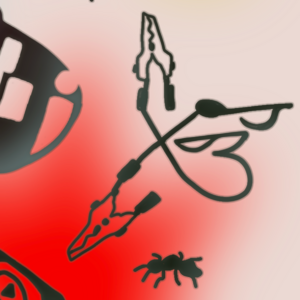Programming gambiarra
| Programming gambiarra | |
|---|---|
| Name | Programming gambiarra |
| Location | Het Wilde Weg |
| Date | 2024/07/24 |
| Time | 10:00—17:00 |
| PeopleOrganisations | Magno Caliman |
| Type | HDSC2024 |
| Web | Yes |
| No | |
Programming gambiarra: jerry-rigging a "zero-component" synthesizer using a microcontroller
The Brazilian-Portuguese term "gambiarra" is widely used in Brazil to denote an improvised solution crafted to solve a localised problem, whilst making creative and many times unintended use of the tools one has at hand. In English, it could be explained as a combination between jerry-rigging and resourcefulness. Scrolling through an image search for the term [1] illustrates the point.
In the field of experimental sound practices, the ethos of gambiarra can be usually associated with practices of DIY electronics: circuit-bending, hardware hacking and bespoke handmade instruments crafted via the reapropriation and modification of electronic devices. My proposed workshop consists on applying the gambiarra attitude towards code and the practice of programming, as opposed to hardware. Making use of only an Arduino microcontroller and a speaker, without any extra circuitry in between (hence "zero-component"), participants will program a basic synthesizer capable of playing melodies, filtered noise, and with sequencing habilities. This will be done by misusing and jerry-rigging two simple functions of the Arduino language: tone() and delay(). Intended use cases and expected behaviours of those functions, as dictated in their respective documentations, will be presented, discussed, problematised, and later subverted.
- duration: 6 hours
- number of participants: no limit
- materials / tools: computer with Arduino IDE installed, Arduino compatible board, speaker cone, 2x alligator clips, 2x jumper wires
- what do participants need to prepare: download Arduino IDE, download code examples from GitHub
Magno Caliman: Brazilian composer and educator by training. Currently researching the ways in which machines can inform our creative practices. Member of the Music, Thought and Technology research group at the Orpheus Insitituut - Ghent, Belgium
